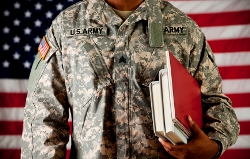|
Central Florida Colleges Prep for Veterans Returning to Classrooms  May 30, 2012 | WMFE - Many soldiers finishing their tours in Iraq and Afghanistan are choosing to go to college as they return stateside to an uncertain job market. But going back to school after serving in the military can be a bit like culture shock, as America's newest veterans go from active duty to the classroom. Here's a look at the different programs offered by two Central Florida colleges as they try to ease what can be a difficult adjustment, and help student veterans achieve success. Christopher Griffin may look like a typical college sophomore fresh from high school, but he served four years as an Army medic before attending Stetson University in DeLand. When he got here after returning from Iraq and leaving the rest of his unit in Fort Bragg, North Carolina, he felt pretty out of place. “I was driving back and forth from my unit a lot. I was having troubles transitioning from the military to civilian life,” he says. “And I couldn’t find any other groups or anyone to speak to around here. So my buddies [were] like, why don’t you just find other veterans around Stetson, and I was like, it’s not that easy. I can’t - there is nothing around Stetson.” So, Griffin started something. He’s now the president of Stetson’s Student Veterans Organization, or SVO. Right now, the group is using a small conference room in the Continuing Education Department as a temporary meeting place. It’s just getting off the ground, with about a half-dozen official members so far – but Griffin says its mission is important. “Pretty much, the Student Veterans Organization is just here to help people transition,” explains Griffin. “We’re not trying to haggle them at all, if they’ve already transitioned or they feel their best way to transition is just forgetting about it, then that’s their own business. But if they want to speak to another veteran, then we are there for them.” The SVO’s faculty advisor is also a veteran, Continuing Education Director Bill O’Connor. He may be the reason the group can meet in the Continuing Ed conference room for now. O’Connor says he expects more student veterans, and soon, since 23,000 troops are scheduled to come back from Afghanistan by the end of the summer. Many of those new student veterans are expected to use their post-9-11 GI Bill benefits, which O’Connor says includes tuition and a monthly living stipend, “which around here’s a little over $1,200 a month. So, now they can actually focus on their education, not wondering how all their bills are going to get paid, because they’re going to get that money, too. And the post-9-11 GI Bill also gives them $1,000 a year in fees and books.” Knowing the details of the post-9-11 GI Bill and working with student veterans is not in O’Connor’s job description. He does it voluntarily. He’s also part of Stetson’s new Veteran Task Force, a group of faculty and students that advises Stetson on the best ways to be welcoming to student vets. Right now, Stetson’s Deland campus does not have a Veterans Affairs office, although its sister College of Law campus in Saint Pete does. While it may have been a student that helped enhance services for veterans at Stetson, at Seminole State College the administration made the first move. But student veterans quickly began helping each other. Ryan Browne is giving a tour of Seminole State’s Oviedo campus, but he’s distracted by a phone call from a fellow student who needs his help. Browne is in a Veterans Affairs work-study program while he earns his Bachelor's degree. Seminole State officials beefed up their services for veterans in 2009, at the same time the Post-9-11 GI Bill went into effect and made jobs like Browne’s possible. His duty is to help student vets navigate class scheduling and education benefits. “It gets complicated fast. Sometimes, I start talking to the counselors to help them understand and you see their eyes glaze over,” he jokes. “So, it’s good to have a VA rep. And also I’m a veteran myself and I’m also using education benefits, so that really helps because I can relate to everything they’re going through.” Browne served four years in the Marines before starting college. He says Seminole State also has a new Student Veterans Association. Brown agrees that military life is very different from the civilian world, but he points out veterans have a lot to offer in the workplace. “Veterans bring a lot of skills and benefits with them: advanced leadership training, advanced teamwork skills, very good mission accomplishment, task-oriented behaviors that are very good for business.” Back at Stetson, student Christopher Griffin says he brought other positives back to college with him, like an especially strong motivation to succeed powered by thoughts of his friends still serving. “I beat myself up when I don’t do something,” Griffin says. “I sit there and say, you know, I couldn’t get a paper done, when I have buddies right now deployed to Afghanistan that would kill to have just a couple hours of sleep? So for me, I look at it as, why didn’t I do that paper? I’ve done more than that in a day’s work, and I couldn’t just sit down and do a 2-page paper. I owe my buddies more than that.” Stetson and Seminole State aren’t the only Central Florida colleges that have special programs for vets. The University of Central Florida has a new Veterans Academic Resource Center with veteran-specific advisors and special events. Valencia State College and Rollins College also have VA Offices. |
|
|